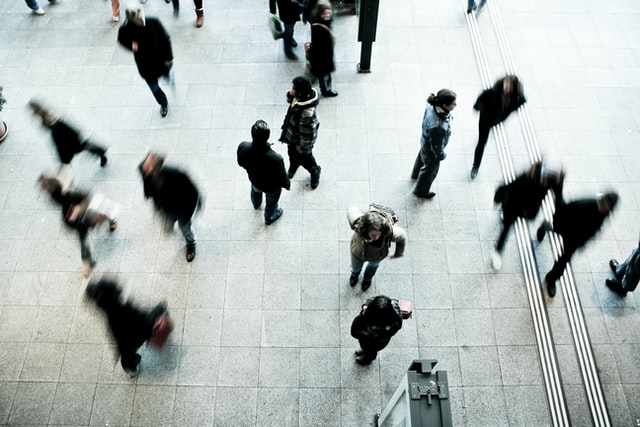The term ‘urban loneliness’ has been mentioned more and more often in recent years. However, what is urban loneliness, exactly? What causes it, and what can we do to prevent or ‘treat’ it? These are the questions we will be attempting to answer.
The explanation
Urban loneliness is a deep sense of isolation and alienation from one’s surroundings despite living in a highly urban (and therefore populated) setting. Now, this might not sound like much of a serious condition. Loneliness is just something you have to face and overcome, right? Unfortunately, this is entirely wrong.
Loneliness, as most people understand it, might seem like something easily cured. “Just find a couple of friends, and you will feel better!” is what you are most likely to hear if you complain about it. However, when you are surrounded by people on all sides yet feel like you cannot connect with any of them, the problem grows and festers. It can quickly turn into depression and apathy.
Depression, of course, is a much more serious issue, and coupled with the continued problem of feeling isolated and lonely, without anyone to turn to, it can be extremely dangerous. Self-harm, destructive behavior, and even suicide can all be end results of such a vicious cycle.
Causes of urban loneliness
The source of urban loneliness cannot be entirely blamed on any one thing. It is the sum of one’s experience of living in a highly urban environment. However, it can be roughly attributed to four separate ‘sources’: Transient city population, social media, demanding jobs, and human nature. To clarify each of these, we will discuss them in more depth.
Transient city population
Everybody knows that more and more people are moving to cities from smaller towns and villages. Be it for education, easy access to amenities, or better chances of finding a job; people are eager to find themselves a spot in the Big City. Few think about how such a style of living affects them, however.
In a rush to live our lives to the fullest, we move from place to place. In a desire to be successful, we switch to better and better jobs. However, doing so doesn’t give us enough time to develop meaningful bonds with coworkers, casual acquaintances, or neighbors. You are not going to set aside the time and effort to get to know someone if you know you will be moving away in a year, will you?
In addition, we are, as a species, becoming more and more individualistic. As such, privacy has become more important. This is just another stumbling block standing between us and companionship, which such a fast-paced and transient lifestyle cannot overcome.
Social media
It might seem like a logical fallacy, but social media is making us less likely to engage in social behavior. The ease of communicating with friends and family, even when you have moved away thousands of miles, makes it unlikely you will attempt to reach out to new neighbors and coworkers in search of friendship. However, while we can chat with them online, such contact with friends and family cannot offer the warmth of human connection and companionship we need.
And that’s not even all! Let’s consider the following: You move to New York City for a fantastic new job. You spend hours researching it and getting to know everything you can. By the time you have moved, you will feel like you know everything about New York, in spite of never having stepped foot in it!
This means that your desire to go out and explore would be significantly diminished. Half the fun of such an outing immediately after moving is the curiosity a new city evokes in you. So, instead of exploring the city after your move, which would let you truly get to know NYC and its people, you would more likely be stuck in your room browsing social media! And that’s no way to find new friends.
Demanding jobs
Setting aside the things we used to enjoy before social media for now, there is another thing preventing us from establishing meaningful relationships: lack of time.
Modern jobs, particularly in the current pandemic, place more and more demands on our time. Working hours keep getting longer. The Internet makes it trivially easy for employers to demand you do even more work at home. And what’s worse, it has become almost a badge of honor to ‘exceed expectations’ and ‘focus on your career’ by throwing yourself into work single-mindedly.
None of these things make it easy to form meaningful friendships or long-term relationships, since we are very much encouraged to give up on such things in favor of acquiring more possessions and material wealth. After all, even if they know what urban loneliness is and that excessive work hours can cause it, a person might not be able to avoid them if they are ruled by their material desires.
Human nature
It sounds counter-intuitive, we know. After all, humans are social animals! We should be thriving if we give into our social instincts and let them drive us to make friends left, right and center. Unfortunately, this isn’t quite right.
While we are most certainly meant to be social, our society has also evolved a tad too quickly. We are still wired to form close and tight-knit bonds with a smaller number of people. The overwhelming numbers we face in large cities are more likely to fill us with anxiety instead. In a sea of faces, individuality tends to get blurred out.
An additional stumbling block is the fact that we weren’t exactly meant to live in thousand feet tall towers of concrete. Such an environment can cause anxiety, mild depression, and disorientation. Not exactly the most conducive environment for making friends, even if we keep getting back into social circles and rekindle our lives after the pandemic.
What can be done
Well, we need to take advantage of the fact that we have the answer to the question of what urban loneliness is and what causes it to strike at its roots. We need to take our jobs less seriously and give ourselves time to socialize. Additionally, we should abandon the safe confines of our social media lives and try to get to know those we live near. We need to pause in our pursuit of ever-better living conditions, let down roots, and appreciate what we have. Finally, we need to build more parks and green spaces where we can escape the hectic reality of city life and be ourselves. If we do so, we will find it easier to connect with people, and once more, we can hope to find true friends that enrich our lives and chase loneliness away.


